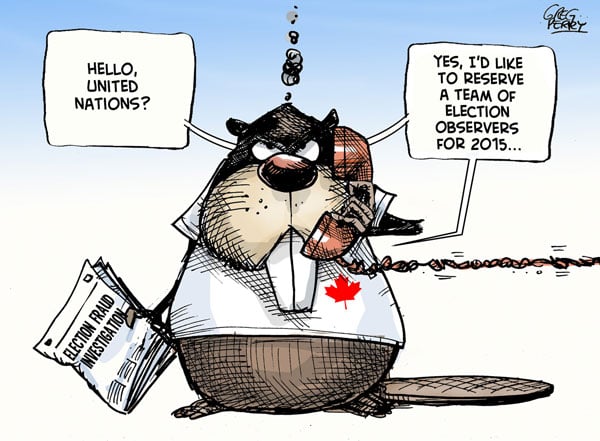For the past decade, the federal government has been underwriting the cost of sending election observers from Canada to more than 40 troubled countries around the world to help them make sure that their elections are as free as possible from fraud, intimidation, ballot-stuffing, voter impersonation, misrepresentation and other abuses.
Canadian observers have joined international efforts to keep elections clean in such places as Ukraine, Congo, Egypt, Russia, Nicaragua, Haiti, Belarus, Sudan, Kyrgyzstan, Lebanon, Mozambique and Georgia (the one in Europe, not the U.S.), among others.
A humble suggestion. Is it not time we invited observers to monitor the honesty of elections in, um, Canada?
I'm not being facetious. This is serious. There are people out there who are intent on stealing elections. They use negative television commercials and Internet web sites to libel their opponents (as happened to Michael Ignatieff last year) to mislead voters about issues. They use accounting tricks to violate election spending limits (as in the Conservatives' "in-and-out" TV ad scam in the 2008 election). The latest sleazy trick is "vote suppression."
Imported from the dark side of American politics, vote suppression is a technique used by some U.S. campaigns, principally Republican, to discourage individuals, generally blacks and low-income voters, from exercising their franchise. They use automated dialing and message systems -- known as "robo-calling" -- to (mis)inform voters that their polling station has moved (when it hasn't), or the voting hours have been changed (when they haven't), or the candidate they support has dropped out (when he or she hasn't).
That's what happened to Irwin Cotler, the Liberal MP for the prized Montreal riding of Mount Royal (it used to be Pierre Trudeau's seat). The Conservatives hired a polling company to spread the false word that Cotler intended to resign from Parliament -- a tactic that Commons Speaker Andrew Scheer later called "reprehensible."
Lying to voters is not new. But robo-calling introduces a new level of sophistication to misrepresentation -- especially when the calls are presented as coming from no less an authority than Elections Canada. That's illegal as well immoral. This form of vote suppression now appears to have begun in the Guelph riding in the 2011 federal campaign and spread to Cambridge, Kitchener-Conestoga, Kitchener-Waterloo and about 23 other ridings as far west as Winnipeg. New Canadians and seniors may be targeted.
When Parliament returned today from its 10-day Family Day break (please don't ask why MPs need 10 days, because I don't know), Liberal leader Bob Rae called for an emergency debate. "We are entering into a kind of Nixonian moment in our political culture, where all kinds of dirty tricks seem to be possible," Rae said on the weekend. He's right about that, but while an emergency debate might give opposition MPs the satisfaction of lashing the Tories, it won't change anything. Nothing will change until the man at the top wants it to change.
Stephen Harper, however, takes the position that if anything bad happened, it must have been the doing of a single rogue individual somewhere in the Conservative organization, acting on his own. He can point to the resignation last week of Michael Sona, a 23-year-old aide to a Tory backbencher, who was implicated in dubious tactics in the Guelph campaign in the last election.
It strains credulity to be asked to believe that a 23-year-old political neophyte could have masterminded a vote-suppression exercise that, according to a Liberal tally, extended to 27 constituencies and, as Rae says, perhaps millions of phone calls -- without the knowledge of any senior people in the Conservative organization.
Harper maintains he is ignorant and innocent of any involvement in dirty tricks. I'm sure he is truthful. He only knows as much as he wants to know, or as much as his handlers feel it is safe to let him know. Deniability is precious thing in politics. But it is no substitute for moral leadership. And that is sadly lacking in Ottawa these days.
[Tags: Politics] ![]()
Read more: Politics















Tyee Commenting Guidelines
Comments that violate guidelines risk being deleted, and violations may result in a temporary or permanent user ban. Maintain the spirit of good conversation to stay in the discussion.
*Please note The Tyee is not a forum for spreading misinformation about COVID-19, denying its existence or minimizing its risk to public health.
Do:
Do not: